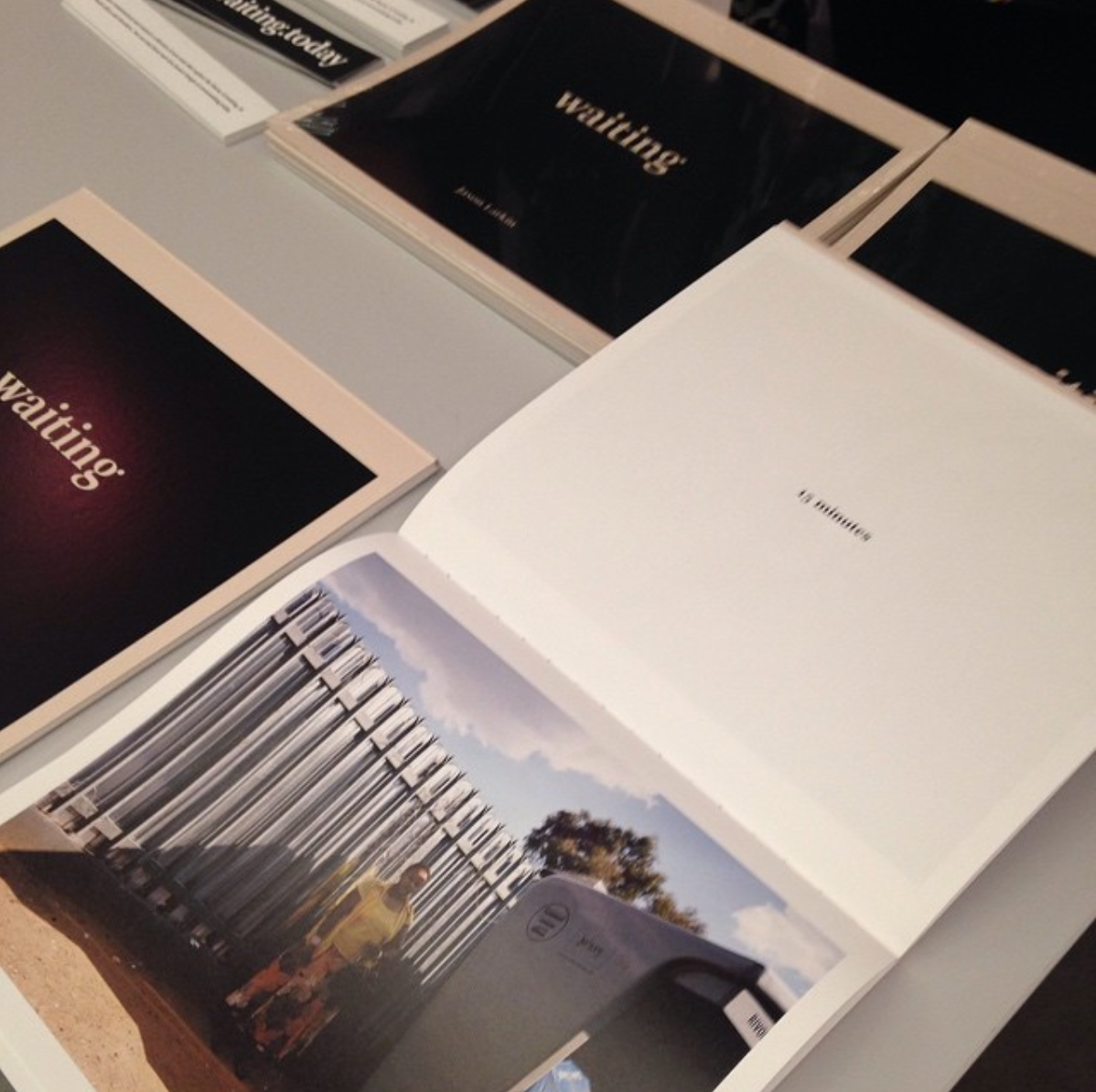The waiting.today website expands on Jason Larkin’s images from our recently published photobook ‘Waiting’ with texts exploring global notions of the same theme. Here Nana Ocran replays the airport scene where her parents are re-united after months of waiting.
Emanuel looked at his watch for the third time that hour. There was a delay at terminal four and he was wishing he’d eaten more breakfast. It had taken a 5am wake-up for the two buses and a coach to Heathrow, but at least he’d saved money by avoiding the taxis. Now the lack of sleep was catching up with him. The novelty of browsing Heathrow’s shops had worn off and the cafés just seemed to taunt him. He opted, along with a growing number of expectant Ghanaians, to station himself at a prime spot behind the long metal barrier to wait for the BOAC arrivals.
He wanted Pentsiwa to single him out when she eventually came down the hall. When she did, he’d spring into action with the coat that he’d bought her, before whisking her and her suitcases off to the tube – a decent decision for the long route to Clapham.
With time to kill, his mind wandered. It was 1963, and almost a year since he’d arrived from Accra. A student, a lodger and now a trainee librarian, he’d developed a new tempo in a country where life had become a series of tasks and deadlines. Decode the accents, pass your exams, find an apartment, hold on to a job, pay your rent, get ready for Pentsiwa, get to the airport, find the terminal, wait at the barrier.
This series of rhythms had become a good way to keep focused, but his new life had also unnerved him. His natural, solitary nature had created a caution that had travelled with him to London. Early on, he’d fallen into a state of inertia. High expectations of the UK experience had been postponed as he’d absorbed the social landscape and found that he was missing from adverts, out of step with the city, and unheard when he spoke.
It was Pentsiwa’s letters that had snapped him out of this, socialised him and pushed him forward. Consequently, his written responses were in line with her forward thinking concerns about UK living, these initially being the English diet, finding African hair products, and her upcoming departure.
Her pointed questions had turned Emanuel into a bringer of news and a writer of bulletins. Over time, he’d posted descriptions of Oxford Street, Trafalgar Square’s pigeons and Unigate milk floats. He’d warned her against paraffin heaters, subterranean toilets and unpicked the events of Profumo’s affair. Six months in, he’d officially ‘sent’ for her and their countdown to coupledom became a welcome distraction from his sporadic episodes of spiritual stasis.
Non-religious, his church had become Speakers’ Corner where, every Sunday, he’d absorb the theatre of the soapbox debates at the edge of Hyde Park. Most weeks he’d managed to form casual friendships with other young men who were much like himself; drawn from parts of the commonwealth but with diverse agendas. ‘I’m sending money back home’, ‘I’m leaving the capital’, ‘I need a new landlord’, ‘my visa’s expiring’. Week by week they’d return to an environment that turned them on to student boycotts, race relations, Cold War politics and Beatlemania. But at times, a pervasive sense of instability would affect them with feelings of living their lives during an extended interval. They’d dwell on their futures, which they hoped would sufficiently showcase their British achievements.
The jingled warning of a public announcement jarred Emanuel and broke through his thoughts. There was a static pause before a clipped female voice confirmed that the BOAC flight from Accra had landed. Expressions of vocal relief mixed with mild grumbles of irritation rippled through the crowd, which had swelled and now moved as a unit much closer to the barrier. A few drivers to the far end of the railings stood close to the doors that would release the flight’s passengers. Each held signs that they’d soon hold aloft to tempt jaded travellers with private car service.
A sweat patch had formed at the front of Emanuel’s shirt where he’d used the large bag with Pentsiwa’s coat to cushion his ribs against the metal. This wasn’t quite how he’d planned to greet her. He shifted his weight from his left leg to his right, easing his lower back muscles. A subtle layer of contentment started working its way through his system. The doors by the drivers had started to bump open. A clamour of voices made Emanuel quickly look backwards then forwards. The first set of arrivals had made it.
This article was originally published on waiting.today, a website created alongside our recent publication with Jason Larkin and Fourthwall books.
button link=”http://shop.photoworks.org.uk/products/waiting-jason-larkin” icon=”fa fa-shopping-cart” title=”Visit our shop to order this title”]
waiting.today shows images from Jason’s waiting series alongside a collection of essays, poems and stories exploring global perspectives on the same theme.

